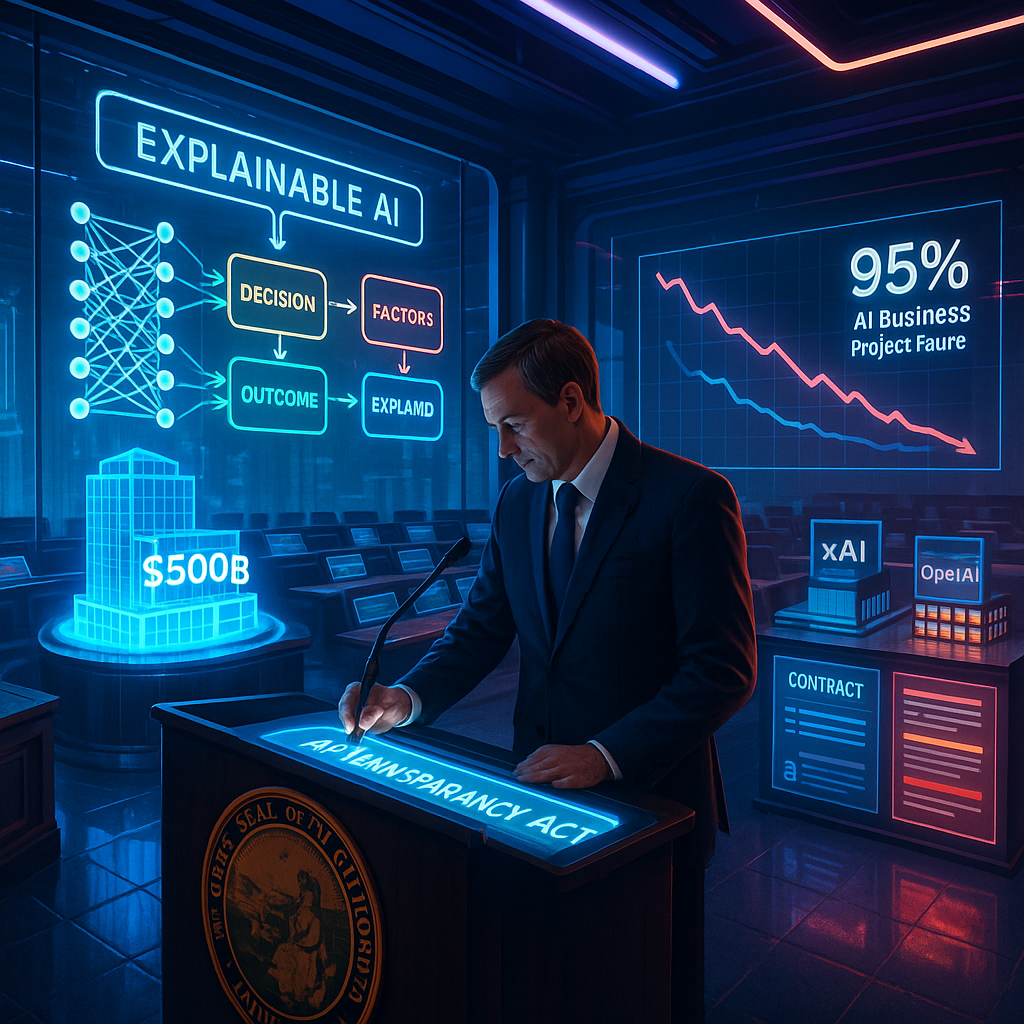Key Takeaways
- Top Story: California enacts an AI transparency law, setting new standards for how advanced artificial intelligence systems must explain their decisions.
- OpenAI achieves a $500 billion valuation, underlining investor confidence and raising questions about concentrated power in the AI sector.
- Despite significant investment, more than 95% of AI business projects do not generate increased revenues, highlighting a gap between AI promise and practical results.
- Elon Musk’s xAI files a trade secret lawsuit against OpenAI, intensifying debate over collaboration, competition, and intellectual property within the AI industry.
- The relationship between technological ambition and regulatory oversight reflects a broader societal reckoning with the expanding role of “alien minds.”
- These developments invite reflection not only on how we deploy AI, but also on how we choose to understand and govern its growing presence.
Introduction
On 5 October 2025, California’s enactment of a pioneering AI transparency law set a new ethical and regulatory standard for advanced artificial intelligence, requiring algorithms to explain their decisions in understandable language. This landmark move resonates throughout AI industry developments and society. Today’s review examines the implications, alongside OpenAI’s $500 billion valuation and its significance for market confidence and power dynamics.
Top Story
California has enacted an AI transparency law that establishes rigorous new requirements for how advanced artificial intelligence systems explain their decisions. The legislation mandates that AI systems utilized within the state must provide clear, human-understandable rationales for key outcomes, addressing calls for greater accountability and oversight.
State officials described the law as an essential response to the challenges posed by rapidly advancing AI. By requiring explainability, the measure aims to build public trust and set a precedent for regulatory frameworks beyond California. Industry stakeholders are assessing how these standards will affect product development and deployment timelines.
Legal experts noted that California’s move may become a model for federal and international approaches to AI governance frameworks. The law is scheduled to take effect in March 2026, giving companies a limited window to adapt their practices.
Stay Sharp. Stay Ahead.
Join our Telegram Channel for exclusive content, real insights,
engage with us and other members and get access to
insider updates, early news and top insights.
 Join the Channel
Join the Channel
Also Today
OpenAI Achieves $500 Billion Valuation
OpenAI’s valuation has reached $500 billion. This milestone underscores sustained investor faith in the company’s leadership of generative AI but has also intensified conversations about the risks of consolidation and concentrated influence in the sector. Analysts highlighted that while the valuation signals optimism about AI’s potential, it brings renewed scrutiny regarding organizational transparency and societal impact.
AI Project Impact Gap Exposed
A recent industry report found that over 95% of AI business projects fail to generate measurable revenue improvements. Despite substantial investment and enthusiasm, most initiatives have struggled to deliver practical returns. Researchers attributed this gap to skill shortages, unclear objectives, and the complexity of integrating AI into existing workflows.
Amid the challenges of real-world AI deployment, new AI model applications are emerging to help bridge the gap between promise and results.
xAI Files Lawsuit Against OpenAI
Elon Musk’s xAI has filed a trade secret lawsuit against OpenAI. The legal action centers on alleged misappropriation of proprietary research related to AI model training processes. Observers stated that the dispute highlights broader tensions around intellectual property, collaboration, and competition as the industry matures.
Also Today: Healthcare and Education
Healthcare Innovation
Researchers at Stanford Medical Center recently unveiled an AI system that identified novel drug compounds for resistant infections. By analyzing decades of clinical trial data, the system suggested previously unexplored molecular combinations. This breakthrough could accelerate drug development by an estimated 40%. Clinical trials for the initial AI-suggested compounds are set to begin in March 2026.
The American Medical Association has released updated guidelines for the integration of AI in clinical practice. The guidelines emphasize human oversight and acknowledge AI’s increasing role in both diagnosis and treatment planning.
The responsible integration of AI in clinical settings is closely connected to ongoing discussions about algorithmic ethics and transparency in automated decisions.
Education and Employment
The Labor Department published a comprehensive report identifying significant shortages in AI-related skills, particularly in machine learning engineering and AI ethics. In response, universities across the United States are launching new interdisciplinary programs that merge technical and ethical training. Industry partnerships offering practical experience have doubled compared to the previous year.
Market Wrap
Technology Sector Performance
AI-focused companies led recent market gains, with the AI Technology Index rising by 3.2%. Traditional technology firms implementing AI solutions saw strong performance, particularly in enterprise software and cloud services.
Venture capital investment in AI startups reached $12.5 billion this quarter, a 25% increase from the preceding period. Analysts noted that investor enthusiasm remains high for companies demonstrating clear paths to scalable AI deployment.
The growth of the sector continues to be shaped by advances in intelligent feedback systems and foundational research into how AI adapts to complex real-world environments.
What to Watch
- Global AI Safety Summit in Geneva on 15 October 2025
- Congressional hearings on AI regulation beginning 20 October 2025
- Quarterly earnings reports from major AI companies starting 25 October 2025
- International AI Standards Conference in Singapore on 1 November 2025
Conclusion
California’s AI transparency law and the broader push for industry openness mark a significant moment in reconciling innovation with social responsibility. These developments are redefining expectations of accountability in artificial intelligence and shaping the trajectory of AI industry developments and society. As these trends unfold, upcoming global safety summits, regulatory hearings, and company earnings will provide further insight into the impact of these changes.
For deeper historical and philosophical context on the regulation of digital decision-making, see the exploration of AI’s origins and our evolving frameworks for understanding and governing artificial minds.





Leave a Reply